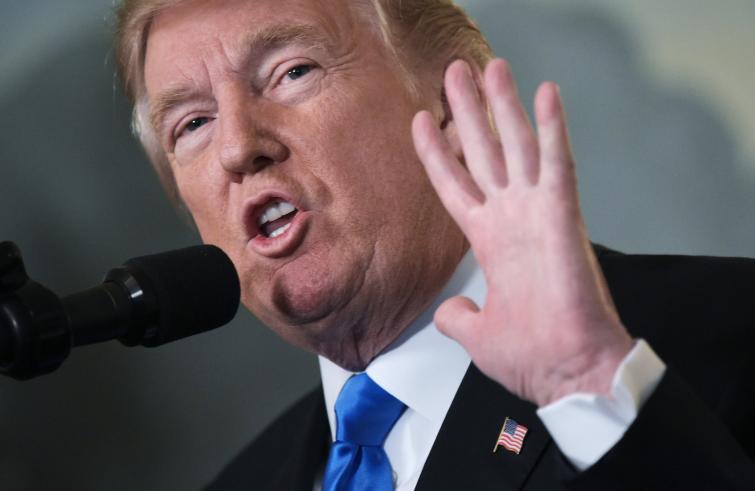
(from New York) The strategic approach with which, yesterday, Trump opened his address to the nation to justify the assassination of Iranian General Qasem Soleimani and to reassure American citizens that no military had been killed in the retaliatory raid in Tehran against two US bases in Iraq is no news. The bold and audacious first remarks were: “As long as I am President of the United States, Iran will never be allowed to have a nuclear weapon”. The conclusion was more moderate and conciliatory: “The United States is ready to embrace peace with all who seek it,” he exclaimed, extending his arms. In just twenty-four hours, the US president went from threatening to destroy Iran and bomb its cultural sites – considered a war crime and condemned by the same Republicans – to a restrained course of action that calls for a new nuclear agreement, NATO’s commitment, ostracised for months, and a partnership with the enemy to destroy ISIS. UN Secretary General, Antonio Guterres, had asked to halt the military escalation and to “restart dialogue, renew international cooperation”, precisely because the world cannot afford a new Gulf war and especially Iraq, currently the theatre of a war involving two international powers that are blatantly violating its territorial sovereignty, killing and devastating.
The U.S. President, while using conciliatory tones that wish Iran “to thrive and prosper like a great Country” and have “a great future, of home and harmony with the nations of the world”, does not renounce menacing language that appeals to his voters but makes his policy seem increasingly controversial. “The fact that we have this great military and equipment, however, does not mean we have to use it”, underlined Trump who doesn’t want to embroil his country in a new war, while he announced withdrawal from Syria and plans to do the same in Iraq, as revealed in a secret letter that landed in the hands of journalists. In his speech he also lashed out against the previous administration, blamed for encouraging a “senseless” nuclear agreement that did not change Iran’s behaviour, as it was the recipient of “150 billions US dollars and 1.8 billions in cash” in return. In fact, in this passage, the president made a series of inaccuracies given that this money is Iranian money frozen in international banks because of sanctions , returned when Tehran complied with the various provisions of the treaty, which the new president now wants to rewrite to distance himself further from his predecessors.
Beyond the rhetoric against General Soleimani, head of the Quds Force, repeatedly called “terrorist” and bloodthirsty, Trump clarified that his interest in the region is not related to oil as inferred by many critics, since his America “does not need Middle East oil”, because “we are now the number one producer of oil and natural gas.” However, the US President failed to mention that his allies depend on oil in terms of production, like the Saudis, and for export, as is the case with the European allies.
Yet the “moderate” Trump did not convince the Democrats and a few Republicans
who will join House Speaker Nancy Pelosi this morning in introducing measures restricting the President’s power to declare war. Republican Senators in Utah and Kentucky slammed the president’s briefing as “inadequate”, suggesting he would not discuss the appropriateness of his military intervention as it would “embolden Iran.” Utah Senator Lee declared: “it is unacceptable and it’s not American. It’s unconstitutional to tell us not to debate, and it’s wrong. We need respect for the limitation of power.”
Trump’s moderate countermove is also dictated by internal security concerns.
The Islamic Republic could use its revolutionary troops in Afghanistan, Iraq, Lebanon, Syria and Yemen to attack the United States and its allies. In addition, the arsenal of ballistic missiles could target US bases in Bahrain, Kuwait, Qatar, Saudi Arabia and the United Arab Emirates. Land mines and missiles could wreak havoc in the Strait of Hormuz and escalate global oil prices. On top of that, sabotage and cyber attacks would make data, banking and financial systems, telecommunications and defence vulnerable. Terror attacks are not ruled out, even though to date those on US territory have always been foiled, while the same cannot be said abroad. Since Trump withdrew from the nuclear accord in May 2018 and intensified sanctions, Tehran has tried to reap benefits from other allies, attempting to diplomatically isolate the US. Since May 2019, however, Iranian attacks have been launched against international cargo ships, a U.S. drone was shot down, and in September Iranian missiles hit the Abqaiq plant in Saudi Arabia, while Shiite militias began firing rockets at U.S. bases in Iraq, killing an American contractor last week. Ultimately, the raid in retaliation for the assassination of the general who, thanks to intelligence advance communications, prevented another massacre.
In his speech Mr. Trump mentions the allies on his side, especially the United Kingdom, France, Germany, Russia and China. Whilst not a fan of collaborating with other countries, the commander-in-chief knows that he needs the Russian and Chinese alliance to share information on potential attacks and, above all, to support UN Security Council resolutions, should Iran continue to develop the atomic bomb, but he is still hoping to surprise the enemy by proposing a new agreement, basically much the same as Obama did, but Trump would never admit this.










